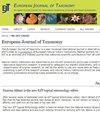石竹属(putranjivacae, Malpighiales)花茎、两性异型和生物地理学的研究,以及对加蓬石竹属和两种中部非洲花茎威胁新种D. aphanes sp. nov和D. cauta sp. nov的分类处理。
IF 1.3
3区 生物学
Q3 ENTOMOLOGY
引用次数: 0
摘要
本文以非洲为研究对象,对其茎叶、两性二态性和生物地理格局进行了初步探讨。我们还对来自中非西部热带雨林的该属的两个新种进行了分类处理,一个是加蓬特有的,从六个集合中已知,D. aphanes Quintanar, d.j.h riss&barber本文章由计算机程序翻译,如有差异,请以英文原文为准。
Notes on cauliflory, sexual dimorphism and biogeography in Drypetes (Putranjivaceae, Malpighiales) and a taxonomic treatment for D. gabonensis and two new cauliflorous threatened species from Central Africa, D. aphanes sp. nov. and D. cauta sp. nov.
We present a preliminary discussion about cauliflory, sexual dimorphism and biogeographic patterns in Drypetes Vahl (Putranjivaceae Endl.), focused on Africa. We also present a taxonomic treatment for two new species of cauliflorous trees of this genus from the rainforests of western Central Africa, one endemic to Gabon and known from six gatherings, D. aphanes Quintanar, D.J.Harris & Barberá sp. nov., and the other distributed in Gabon and the Republic of the Congo, D. cauta D.J.Harris, Barberá & Quintanar sp. nov., also known from another six gatherings. They are presented along with D. gabonensis Pierre ex Hutch., known from 25 gatherings made throughout western Central Africa, a species with markedly dimorphic flowers between sexes compared to the rest of the species in the genus. Specimens of these two new species have been confused with D. gabonensis due to some morphological resemblances. This treatment includes the detailed descriptions of these three species, the typification of their names, a comparative table summarizing their main morphological differences, an identification key, an illustration and information about their habitat and distribution. A provisional IUCN Red List assessment shows that D. gabonensis and D. cauta sp. nov. are ‘Vulnerable’ species, and D. aphanes sp. nov. is ‘Endangered’. After the publication of these new species, Drypetes consists of 86 species in continental Africa and the Malagasy Region and 219 species for the whole world.
求助全文
通过发布文献求助,成功后即可免费获取论文全文。
去求助
来源期刊

European journal of taxonomy
ZOOLOGY-
CiteScore
2.30
自引率
8.30%
发文量
173
审稿时长
29 weeks
期刊介绍:
EJT is a fully refereed, international, fully electronic Open Access journal in descriptive taxonomy, covering subjects in zoology, entomology, botany (in its broadest sense), and palaeontology. EJT-papers must be original and adhere to high scientific (content) and technical (language, artwork, etc.) standards. Manuscripts that are clearly substandard in either of these categories will not be sent out for review. EJT is supported by a consortium of European Natural History Institutes, but its scope is global. Both authorship and geographical region of study need not be European. Authors are, however, strongly encouraged to involve European Natural History collections by consulting material or by depositing specimens (e.g. types and figured material) related to their published paper in the collection of a European Natural History Institute.
 求助内容:
求助内容: 应助结果提醒方式:
应助结果提醒方式:


